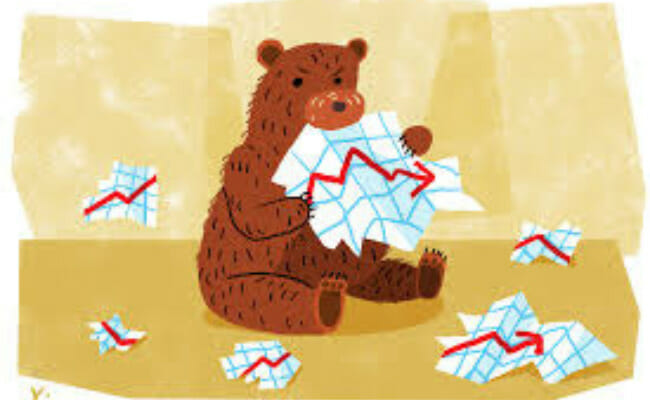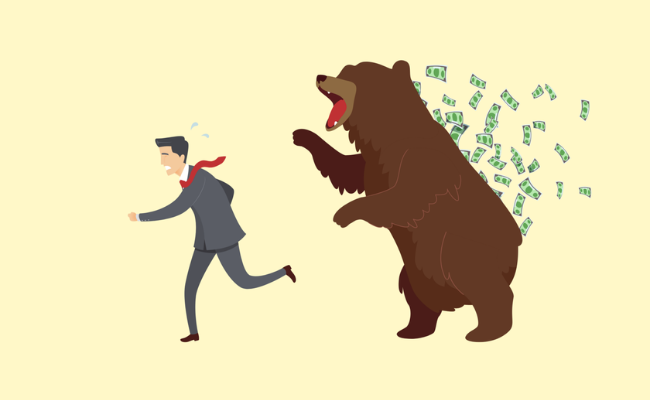Bear Market: Bearer of Bad News for the Economy?
Have you ever searched “What is a bear market?” on the internet? You may have heard it in the news lately, usually after price hikes and other negative news. Believe it or not, a bear market affects everyone, even if you do not hold stocks.
The stock market can show signs of a weak or slowing economy, so economists monitor it. Understanding the implications of a bear market can help you and your family prepare for them.
Fortunately, this article will define what bear markets are in simple terms. Next, we will see whether or not we are now in this type of market. More importantly, we will discuss how you should respond.
What is a bear market?

Photo Credit: www.wsj.com
News reports can be challenging to follow when they explain bear markets, so let us check the most common definition. Start by looking at stock market indexes.
These are a collection of stocks from large corporations, such as the S&P 500 and the Dow Jones Industrial Average. If they dip at 20% or more for at least two months, that indicates bear market territory.
On the other hand, there is also the opposite of a bear market called a bull market. It involves an increase of 20% or higher that lasts two months or more.
According to investment firm Hartford Funds, we have entered bull market territory 27 times since 1928. Also, it noted that the average bear market lasts 2.7 years or 991 days.
Note that there is no “official definition” for a bear market territory. You can find experts with different interpretations of this phenomenon.
If there are varying definitions, what are they trying to measure? Experts want to know the numbers indicating when people become nervous about investing.
In other words, the discussions about bear and bull markets boil down to how people behave. That may have surprised you since stocks often involve numbers and graphs!
What happens in a bear market?
To learn more about bear markets, you need to know how investors behave. That will involve understanding how people in the stock market behave.
Financial markets allow companies to receive funding from investors. Owners get money to run and expand their businesses. If they grow in value, investors earn money too.
If they invested in dividend stocks, they could receive a lump sum every business quarter. Alternatively, they could sell shares once the stock prices are higher.
People feel encouraged to invest when they see rising stock prices. As a result, more buy shares, increasing the share values. That is how bull markets typically work.
Unfortunately, a significant event could reverse a bull market into a bear market. For example, the 2008 Financial Crisis is one of the most notable bear markets.
Rampant real estate speculation raised housing prices until they eventually cascaded. People tend to react negatively toward bear markets.
They may feel that they should stop adding stocks to their portfolio. Companies may stop offering dividends. Those who were planning to sell their shares may earn lower than expected.
If bear markets continue, some investors may sell their shares. Otherwise, they might lose more money. Meanwhile, companies lose access to investment funding for operations and expansion.
Does a bear market mean a recession?
Bear markets signal a slowing economy, so some people connect it to a recession. Images of the Great Depression come to mind when they hear it, so they want to detect its warning signs immediately.
Economists define a recession as a decline in the gross domestic product (GDP) for two consecutive terms. GDP depends on how much a country produces in goods and services.
Those products and services come from businesses that usually perform poorly during bear markets. As mentioned, companies lose funding whenever people are too fearful of investing.
That means startups may struggle to operate with limited capital. Growing businesses might have trouble expanding their services to new locations.
They may put on hold plans for new products and services. Worse, they could raise prices on existing offerings to compensate for bear markets.
In response, consumers would likely spend less on stuff. Businesses may need to cut down on costs as bear markets continue. They might reduce the quality or quantity of their products.
Some people know this trend as skimpflation and shrinkflation. Companies might also start laying off workers, causing more people to cut back on spending.
All in all, bear markets could cause recessions due to these effects. However, one factor alone cannot lead to economic recessions.
Factors that cause a bear market

Photo Credit: medium.com
Bear markets tend to occur after a significant event. As mentioned, a housing bubble turned into the 2008 Financial Crisis.
You might be asking, “Are we in a bear market?” after reading about the topic. The answer that most experts will give you is a resounding “Yes.”
Nowadays, we could point to various events that led to the current bear market. Examples include the COVID-19 Pandemic and the Ukraine-Russia conflict.
Both of them prolonged price declines in stock markets. Here are other factors that could cause negative investor sentiment:
- Issues within companies could raise the bear market risk. For example, they might stop paying dividends or release a dismal earnings report.
- Interest rates from the Federal Reserve determine how much it would cost companies to borrow money. A rate hike could make government-backed securities more attractive than stocks. As a result, they may start selling shares, causing their values to go down.
- Exchange rates affect the cost of doing business in a country. Companies may struggle to procure materials and sell goods overseas if a country’s rate is low. Eventually, their share prices may drop and lead to a bear market.
What should I do in a bear market?

Photo Credit: medium.com
Note that the downturn will end eventually. Economies run on a cycle of ups and downs, so that we might see a bull market soon. What should you do before that happens?
Believe it or not, you might want to try and invest. A bear market means stock prices are lower than usual, so it could be your chance to build your portfolio.
The lower prices also mean that you could earn more from stocks. You could sell it as the market recovers to profit from the difference.
Note that other investors think that when a bear market occurs. If many people start buying stocks, a bear market rally could start.
If you already own stocks, you may feel nervous. Here are the steps you might want to take during such market downturns:
Avoid emotional reactions.
Investors tend to feel anxious about market swings. After all, a sustained period of market dips could take all your money away.
Become swayed by these trends, and you could worsen your losses. Let us say your stock’s price dropped, and you sold it during a bear market.
If that market turns around, your shares are not there anymore to grow with it. Repurchase them, and you probably will not be able to get the previous price.
Also, you would have to pay fees again. Investing involves risk, so keep that in mind when making financial decisions.
Review your goals.
You can easily forget that you could lose money when investing. First-time investors often enter during a bull market, pushing prices upward.
Past performance could encourage them to accept more risk until prices drop. You could avoid that by going back to your investment plans:
- Look at the goals that motivate your investment decisions.
- Then, look at your current portfolio to determine if your assets align with your goals.
- More importantly, look at broad market conditions to assess your risk tolerance.
Conclusion
You could mitigate losses and boost earnings by forming a diversified portfolio. You could invest in other asset classes besides stocks.
For example, if a stock index falls due to bursting market bubbles, you could compensate for gains in real estate. You should choose your assets yourself.
This article does not promote advisory or brokerage services. Speak with a financial advisor for professional investment advice.
All writers’ opinions are their own and do not constitute financial advice in any way whatsoever. Nothing published by Inquirer.net constitutes an investment recommendation, nor should any data or Content published by Inquirer.net be relied upon for any investment activities.
Usa.inquirer.net strongly recommends that you perform your own independent research and/or speak with a qualified investment professional before making any financial decisions.
Frequently asked questions
What happens during a bear market?
People are less likely to invest in a bear market, so investment prices decline. However, a new bull market eventually comes after a few years.
How long do bear markets last?
The typical bear market lasts for 991 days or 2.7 years. However, some economists warn of a more prolonged downturn due to unusual factors like the COVID 19 pandemic.
Should I invest in the stock market?
You should have a clear goal before investing in any asset. Free online resources like this article can help you. However, you may want to consult a financial advisor for better guidance.

